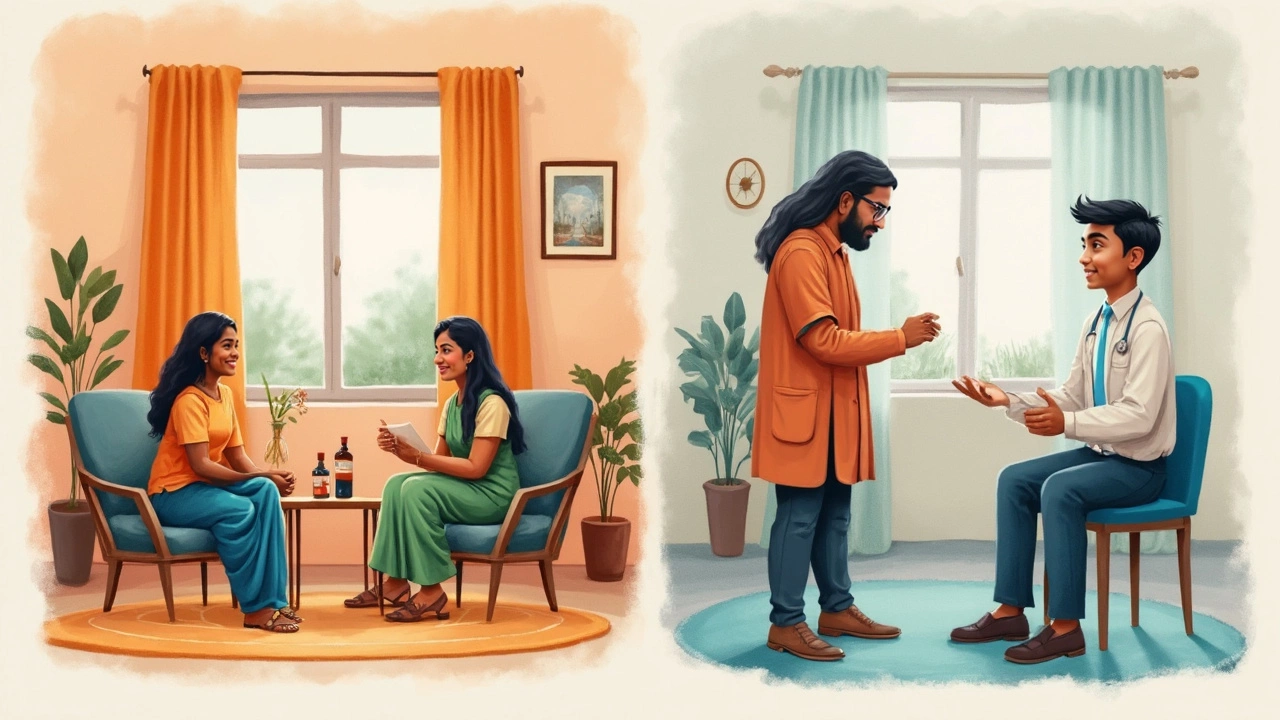Trying to figure out whether you need a therapist or a psychiatrist can feel overwhelming. Most people just want help—fast—and get stuck wondering which choice gets results. Here’s the practical truth: both play vital roles, but they work in different ways.
Therapists are all about talking—think of them as the people you sit with when you want to understand your feelings, deal with stress, or change habits that hold you back. You won’t get prescriptions or medical advice, but you do get ongoing support and real-life strategies for stuff like anxiety, relationship problems, or tough life events.
- Who Does What: Therapist vs. Psychiatrist
- When to Pick a Therapist
- When a Psychiatrist Makes More Sense
- How Sessions Actually Work
- Making the Choice for Your Situation
Who Does What: Therapist vs. Psychiatrist
If you’re trying to work out the difference between a therapist and a psychiatrist, you’re not alone. It sounds obvious on paper, but most people mix them up at some point.
Therapists help you dig into your thoughts, feelings, and behaviors. They can be psychologists, counselors, clinical social workers, or even marriage and family therapists. What matters most: they don’t prescribe medication. Instead, therapists use talk therapy—cognitive behavioral therapy (CBT), dialectical behavioral therapy (DBT), psychodynamic therapy, and more. They help when you want to unpack stuff like anxiety, depression, relationship issues, life changes, trauma, or bad habits. Some even offer group or family sessions.
- Therapists = masters of listening, asking questions, giving feedback, and teaching coping skills or new ways to think.
- Expect regular weekly or biweekly sessions, most about 45-60 minutes.
Now, psychiatrists are medical doctors. They’ve graduated from medical school, completed psychiatric residency, and can prescribe medication (antidepressants, anti-anxiety meds, mood stabilizers—basically anything in the mental health pharmacy). Some psychiatrists mix meds with talk therapy, but these days, most focus on diagnosis, medication management, or tricky cases that need medical care—think bipolar disorder, schizophrenia, or major depression that isn’t budging with therapy alone.
- Psychiatrists = masters of medication, diagnosis, lab tests, and supervising medical treatment for mental health conditions.
- Expect shorter appointments for med check-ins, usually 15–30 minutes after the first detailed visit.
If you want the specifics lined up, here’s a side-by-side comparison:
| Role | Therapist | Psychiatrist |
|---|---|---|
| Education | Master’s or Doctorate (non-medical) | Medical Doctor (MD or DO) |
| Prescribes Medication? | No | Yes |
| Main Focus | Talk therapy, coping strategies | Diagnosis, medication, severe conditions |
| Session Length | 45-60 minutes | 15-60 minutes |
Bottom line: If you need medication for a mental health issue, you need a psychiatrist. If you want to talk through problems, change thought patterns, or work on your stress, a therapist probably makes more sense. Of course, a lot of folks see both—and that’s totally normal too.
When to Pick a Therapist
So when should you actually see a therapist instead of heading straight to a psychiatrist? If you’re mainly dealing with stress, relationship drama, work challenges, or just can’t shake the blues, a therapist is probably your best first step. They’re trained to help with life’s everyday messes—think anxiety, burnout, grief, self-esteem issues, and problem habits like procrastination or comfort eating.
A lot of people worry their problems “aren’t serious enough” for therapy. That’s just not true. If your thoughts or feelings are getting in the way of your life, it’s worth booking a session. Therapists work with:
- Anxiety or constant worry
- Depression (especially mild to moderate cases)
- Coping with breakups or job loss
- Anger issues
- Problems at school or work
- Family drama or relationship issues
- Habit change (quitting smoking, binge eating, etc.)
Here’s the cool thing: therapy isn’t just for big crises. Studies from the American Psychological Association show up to 75% of people who try therapy feel better after a few months. It’s about giving yourself tools to handle whatever life throws at you.
Therapists don’t prescribe meds, but they do help you spot patterns and make a plan for change. You might meet weekly at first, and then less often as you start building confidence and skills. Some folks find just a handful of sessions is all they need, while others check in for years, like emotional maintenance.
So, if you want practical support, someone to really listen, and simple strategies to break out of old ruts, booking an appointment with a therapist is a solid choice.

When a Psychiatrist Makes More Sense
If you’re dealing with severe symptoms—like nonstop panic, hearing voices, suicidal thoughts, or episodes that totally disrupt your daily life—a psychiatrist is usually the right call. Here’s why: psychiatrists are medical doctors trained to diagnose and treat complex mental health disorders. They can prescribe medication, adjust dosages, and watch out for any side effects. If therapy hasn’t worked or your symptoms seem out of control, skipping straight to a psychiatrist can help you get the right meds and a game plan fast.
Conditions like bipolar disorder, schizophrenia, major depression, or sudden severe anxiety attacks often need medical treatment first. You might’ve heard that about one in five adults in the U.S. takes some form of psychiatric medication, showing how common it is to get help this way. No need to stress—seeing a psychiatrist doesn’t mean you’ll be put on meds forever. Sometimes, you just need that boost from medication to make other changes possible.
Wondering when it’s time to see a psychiatrist instead of a therapist? Watch for these red flags:
- Symptoms are so intense you can’t sleep, eat, or function at work or school.
- You’ve tried therapy, but things aren’t getting better.
- You or someone close to you is worried about your safety (or you’re thinking about hurting yourself).
- Mood swings, hallucinations, or lots of paranoia make daily life pretty rough.
- You want to talk about medication as part of your mental health plan.
Lots of people start with a therapist and end up adding a psychiatrist into the mix. It isn’t either-or—sometimes you need both. If you’re unsure, ask your regular doctor. They can give a quick assessment and refer you if things look serious.
| Therapist | Psychiatrist |
|---|---|
| Talk therapy | Can prescribe medication |
| No meds | Medical school+psychiatric training |
| Great for mild/moderate issues | Key for severe or persistent conditions |
Bottom line: if you’re struggling with big symptoms, don’t wait. A psychiatrist can quickly get you on track, sometimes in one session. Your brain is worth it.
How Sessions Actually Work
Walking into your first therapist or psychiatrist session can feel weird. Most people aren’t sure what to expect, so here’s what it really looks like—no sugar-coating.
Therapy sessions are usually one-on-one, face-to-face chats that last around 50 minutes. The first session is mostly about history—what’s bugging you, your family life, maybe stuff about growing up. Don’t worry, you won’t have to spill everything, but your therapist will ask questions to get the big picture. After that, sessions go deeper, often once a week. You might tackle things like managing anxiety, how to set boundaries, or just ways to cope with bad days. Therapists use different styles (like CBT, which stands for Cognitive Behavior Therapy) but the main thing is—it’s a safe zone for talking it out.
Psychiatrist sessions feel a bit more medical. Psychiatrists are doctors, so the first visit usually covers your mental and physical health history. Expect questions about sleep, mood, and even current meds. The first session might be 30-60 minutes, but follow-ups can be as quick as 15 minutes. Why so short? It’s often about checking if medication helps or causes side effects, and adjusting as needed. You usually won’t dive deep into your personal life every time.
Want to see the main differences at a glance? Spot the breakdown below:
| Type | Session Length | Focus | Prescription? |
|---|---|---|---|
| Therapist | 50 mins | Talk therapy, coping, relationships | No |
| Psychiatrist | 15-45 mins | Diagnosis, meds, symptom check | Yes |
One tip: you don’t have to pick just one. It’s common for people to see a therapist for the day-to-day talk and a psychiatrist for meds. If you’re unsure, ask whichever pro you meet first—they help you find what fits best.

Making the Choice for Your Situation
The decision between a therapist and a psychiatrist really comes down to what kind of help you’re after and your specific mental health needs. If you’re dealing with feelings of sadness, stress, relationship struggles, or you just feel stuck, a therapist is usually the go-to. They’re trained to dig into your thoughts and behaviors, giving you tools and support to handle day-to-day stuff.
But if your symptoms get in the way of basic things—like eating, sleeping, or even showing up for work—or you have a strong family history of mental health conditions, a psychiatrist could be the better option. Psychiatrists are medical doctors. They can run tests, rule out physical causes, and prescribe medication if it’s needed. It’s not rare for people to see both, especially when therapy and medication work best together.
Here’s a way to think about it:
- If you’re looking for talk therapy, coping strategies, or a place to vent, start with a therapist.
- If you suspect you might need medication or you’ve tried therapy before without much progress, a psychiatrist might be right.
- You can always switch it up or add the other later—lots of folks combine therapy with meds and get solid results.
Worried about cost or finding the right fit? Therapists usually cost less per hour than psychiatrists. Most psychiatrists in the U.S. spend about 15-30 minutes per session for med management, while therapists often offer longer sessions (50 minutes isn’t unusual). Here’s a quick look at average costs (without insurance, as of 2024):
| Provider | Average Cost Per Session | Session Length |
|---|---|---|
| Therapist | $80–$200 | 45–60 min |
| Psychiatrist | $150–$400 | 15–45 min |
Coverage can vary—some insurance plans will cover both types, others might only handle therapy. Don’t be afraid to ask providers up front if they take your plan or offer sliding scale options.
One handy tip: don’t wait for a crisis to make the call. If you’re asking yourself whether you need help, that’s already a good enough reason to reach out. And if you start down one path and it doesn’t feel right, it’s totally normal to try a different approach. Mental health support isn’t one-size-fits-all.
If you ever have thoughts of self-harm, suicidal feelings, or things feel out of control, a psychiatrist—or even the ER—should be your first stop. Safety always comes first.





